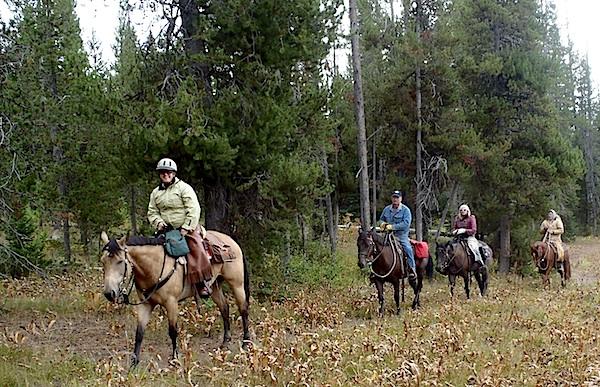
Horse travelers in the Bechler region of Yellowstone National Park. Should backcountry horse travel be banned in the parks?/Kurt Repanshek
Horses have a long, long history in America. They came to the New World with the Spaniards and have been carrying riders ever since. In many national parks horses are icons, seen as both honorable steeds that carry mounted rangers and as work horses that carry both visitors and gear. But they also have impacts on the landscape, and there have been calls to ban them from the parks. But should they be banned?
It's a difficult question, in part because of the long role horses have had in this country and for the ongoing roles they serve in the parks. But they cause some glaring impacts on the landscape, both in terms of erosion where they cross through creeks, in muddy trail settings, and in the waste they leave behind.
But quite a few livelihoods are involved with horses in the parks, too, largely involving outfitters who lead everything from hour-long trail rides to multiple-day pack trips. The specter of Sequoia and Kings Canyon national parks temporarily banning pack trips because the requisite environmental studies hadn't been conducted prompted Congress to intervene. That matter was spurred by the High Sierra Hikers Association, which filed a lawsuit to both get the National Park Service to meet the provisions of The Wilderness Act and to protect the sensitive environmental landscape of wilderness in Sequoia and Kings Canyon. The association was not trying to ban outright horse trips into the high country of the two parks, but rather was seeking what it believes is a more manageable level.
Talk of banning horses from national parks also comes up with talk involving mountain bike access to the parks, as it's pointed out that mountain bikers have far less impact on trails than do horses and yet often they're not allowed to ride single-track trails in the parks.
So, what do you think should be done? Should the National Park Service ban horses in the parks, restrict them to certain trails, or restrict them to use only by rangers? Or some other solution?

 Support Essential Coverage of Essential Places
Support Essential Coverage of Essential Places







Comments
Boy was that a one sided comment. The reason you have the freedom to hike those trails. Without horses, we would not have the freedom to do all the things we enjoy in this country.
How far do you think we would have gotten had the brave men who fought and died for your freedom were without horses.
Millions of horses gave their lives in battle that had no reason to be involved except that man needed help to acquire your freedom. What did you sacrifice?